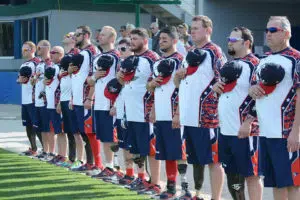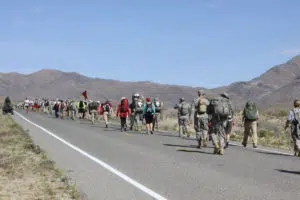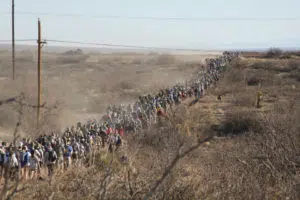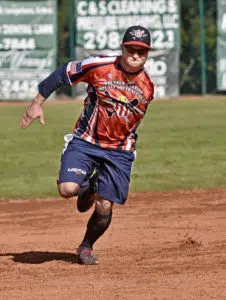Wounded Warrior Amputee Softball Team Members to Participate in 26-Mile Bataan Memorial Death March
By Dustin Schoof

Photo courtesy of Wounded Warrior Amputee Softball Team | thewwast.org
For the 36 players who make up the Wounded Warrior Amputee Softball Team, what they accomplish on and off of the field reaches beyond home plate.
The mission of the Virginia-based non-profit is to inspire and educate others while enhancing the health and welfare of wounded amputees. They follow one, but simple, but powerful mantra: a life without limbs is not limitless.
For Frank Wasson, that saying hits close to home.
Wasson lost the lower, below the knee, half of his left leg in combat during a 15-month deployment in Iraq. His unit came under while on night patrol during an ambush, during which a RPG ripped through his truck — and through his leg. Though injured, Wasson managed to escape the vehicle and administered first aid to the truck’s driver while radioing in for help.
Six years later and now retired from the Army, Wasson resides in Salemn, Oregon, with his wife, Brooke, and their two sons, Drayson (12) and Jackson (8). Wasson has re-ignited a passion he once thought was lost and re-discovered a feeling of accomplishment as a member of the Wounded Warrior Amputee Softball Team. He joined the team in early October 2015, upon the recommendation of a prosthesis expert.
“It’s been great,” he says. “You’re surrounded by other positive people who encourage you to push harder and keep playing the game as if you had both limbs.”

Photo courtesy of Bataan Memorial Death March | bataanmarch.com
Wasson this weekend will be one of several Wounded Warrior softball players traveling to the Southwest to participate and represent the team in the annual Bataan Memorial Death March. The event, which honors the servicemen who defended the Philippines Islands during World War II, will take place on Sunday. The march itself is a 26.2-mile walk over challenging terrain through White Sands, New Mexico, according to the event’s website.
Dennis Wince, executive director for the Wounded Warrior Amputee Softball Team, says a donation from Knight Point Systems greatly helped in covering travel expense and hotel accommodations for the team. “It’s not softball, but our mission is not softball,” he says.
However, it will be a bittersweet weekend for Wasson. Relatives on both Wasson’s father and mother’s sides of the family, along with thousands of other American and Filipino prisoners of war, were forced to make the journey by foot in April 1942 from Camp O’Donnell in Mariveles, Bataan, to San Fernando, Pampanga following the Battle of Bataan.
“This is the perfect opportunity to push ourselves mentally and physically, while honoring the veterans of the Philippines,” he says. “If not for all of these World War II veterans, we’d all be speaking a different language.”
In addition to being involved in the memorial march, Wasson plans on visiting the Las Cruces Veterans’ Memorial Park during his stay. Watson has family roots in New Mexico, as his mother and father lived in opposite sides of the state.
It was Wasson who suggested that the team sign up for the march. “I thought we should try to do something that isn’t softball, do something out of our comfort zone,” he says. “Prior to (joining) the military, it was something I always wanted to do.”
Wasson’s story is just one of many tales of courage and overcoming obstacles that is indicative of the spirit and determination of the Wounded Warrior Amputee Softball Team, Wince says. The team was founded in 2011. “To hear their stories, they’re very different but very much alike,” he says. “Seeing what the team has meant to them and the camaraderie and hope that those other guys provided; to see it come full circle, to see those same guys out there, helping other amputees, other Wounded Warriors. They’re the true inspiration.”

Photo courtesy of Bataan Memorial Death March | bataanmarch.com
Starting in the winter, the players go through spring training and then head across the country to compete against able-bodied teams (both competitively and in exhibition games) to “demonstrate the power of some our nation’s finest,” Wince says. Their season consists of between 25 and 30 events in a year, including tournaments, for a total of between 70 and 75 games a year. In December, the team will travel to the U.S. Virgin Islands to compete.
However, adhering to their mission statement of instilling hope and empowerment in wounded veterans and service men and women means educating and helping others outside of the baseball diamond.
Many players are active in their own communities. They often share their stories and struggles through guest lectures and speaking engagements and visit local children’s hospitals, among other educational programs. Wasson has spoken with the University of Oregon to meet with the school’s Reserve Officers’ Training Corps (ROTC) student members. “I enjoy meeting new kids and helping inspire them,” he says.
Each summer, the Wounded Warrior Amputee Softball Team hosts a Kids’ Camp for children between the ages of 8 and 12. Players from the team serve as coaches and mentors for the group of about 20 kids.
This will be the fourth year for the camp, which will be held June 13 through June 18 in northern Virginia. The Wounded Warrior Softball Team pays for all of the expenses for each child and a guardian to attend, Wince says.

Photo courtesy of Wounded Warrior Amputee Softball Team | thewwast.org
“The highlight of any year is our Kids Camp and to see the way we take 20 kids, some of whom are shy, whom in many cases have never interacted with children with amputations or missing limbs. It’s pretty amazing,” Wince says. “To see people come up to us afterward and thank us, not only for their service, but telling us they are inspired by our players; a lot of people are going through hard times in their own life and a lot of our guys inspire them. Our guys show you can work through sort of anything.”
The Wounded Warrior Amputee Softball Team has also partnered with the Johnny Mac Soldiers Fund. The fund assists with the college education of fallen veterans’ children, according to the Wounded Warrior website. This year, the team’s uniforms will feature the Johnny Mac logo.
Wasson says being a part of the softball team has dramatically helped with his recovery. He enjoys and savors the time he spends around other veterans and military personnel through the softball team, speaking the lingo and reconnecting with his past. Wasson jokingly says he envisioned himself as eventually turning into “a crusty old sergeant” before his life changed in an instant.
“We encourage each other to do better,” he says. “It all starts with a mind change and an attitude change. In my instance, and for a lot of the guys on the team, a lot of them had a life career in mind of being in the service. The next day, your whole plan has changed,” he says.
Wince echoes that sentiment. He says while some of the players’ injuries are visible, others are not as easily identifiable by the naked eye.
The team’s roster includes players, most of whom range in age from 25 and 35-years-old, who were not injured during wartime combat, but during military training and exercises. It is a lineup that touches all corners of the United States, from Maine to Florida to Seattle to California and everywhere in between. Some are still active service members, others have gone to college through the Post-9/11 G.I. Bill.
Wince, whose background includes a 22-year stint in the Army, says, like Wasson, he has found a new purpose and new direction since he became a part of the Wounded Warrior Amputee Softball Team family in February 2015.
“The way our older guys mentor the newer guys and bring them on is really neat and rewarding to see. It’s truly amazing and I would do anything for these guys to help them and help them progress,” Wince says. “The team has helped a lot of these guys, not only on the mental side, but through pure informational sharing.”
